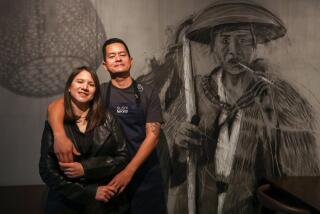Japanese Roots May Help Business Grow
- Share via
Growing up in Ogden, Utah, Irene L. Kinoshita knew about being different.
“It was more being non-Mormon than Asian,” Kinoshita said. “In public school, the teachers would ask, ‘How many of you are Mormon?’ Almost everyone else would raise their hand. It happened more than once.”
It was only later, after starting college at San Francisco State, that she began to understand the world’s ethnic diversity. As Sansei, meaning two generations removed from Japan, Kinoshita and her two sisters and brother had discarded most of their Japanese ways, as had her parents.
“In Utah, all Asians were lumped together, and we weren’t even Asians, we were considered Orientals,” said Kinoshita, now 41 and an Irvine resident. “I didn’t know there was a difference between Japanese and Chinese. But California was different. There were so many more Asians here.”
Today, a curiosity about her grandparents’ homeland remains with Kinoshita. As the owner of Costa Mesa-based Alliance Infonet/Valcom, a high-tech company that specializes in linking computers within companies, Kinoshita dreams of exporting her American-won expertise to Japan and throughout Asia.
“I still have this desire to travel in Japan and the rest of Asia . . . places like Singapore and Thailand,” said Kinoshita. “A lot of it stems from being Asian, but I also look at it as a great business opportunity. What I would like to do is take my technology and skills and go to Asia and form partnerships with Asian companies.”
In the American business world, those skills and her position as the owner and president of a high-tech company make her a rarity, especially in Japan. But she is confident that her sex will not hinder her.
“I think the strategy I’m going to take with me is that I’m an American business person,” Kinoshita said. “Hopefully, we will get around the fact that I’m a woman. But I don’t expect to be treated like a Japanese.”
Kinoshita spent two years in Japan after college and met her husband there. But her strong Japanese roots were no help when it came to learning the language of her ancestors.
“Learning Japanese was without a doubt one of the most difficult things I have ever done in my entire life,” she said. “But I was determined to learn how to speak it. I had a real curiosity about it.”
The expressions of her grandparents began to make sense.
“I remember listening to my grandmother and understanding very little about what she said,” Kinoshita said. “I kind of understood emotionally what she was saying. But, later, when I understood the language, I recognized some of those things I had heard.”
Of the four children in her family, she is the only one who took the time to learn Japanese.
“That’s because it’s not encouraged by our American culture,” she said. “Our American culture tells us, if you don’t speak English, you don’t belong here. It’s simply hurry up and learn English, which is a shame.
“Probably the biggest influence on us was not that we become something or someone, but that we not embarrass the family name,” Kinoshita said. “That’s probably been the biggest guiding force in my life.”
More to Read
Inside the business of entertainment
The Wide Shot brings you news, analysis and insights on everything from streaming wars to production — and what it all means for the future.
You may occasionally receive promotional content from the Los Angeles Times.










